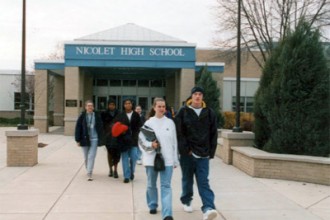If our children are going to learn in school and succeed in life they need opportunities to learn, like quality early childhood educational experiences.
The Wisconsin State Journal made that point very well in a recent editorial (“Sooner is better than later in learning”). Children from poverty face an array of problems that hold them back when they enter school. The paper talked about the United Way of Dane County’s Parent-Child Home Programs as a way to “help more parents give their children a good start at learning.”
This program and others, including Head Start and local efforts around the state and country, have been around for years. In this specific instance, United Way points to studies that suggest participants were better prepared for kindergarten, had higher test scores in elementary school and were more likely to graduate than non-participating peers.”
The jury is in and the verdict says it works: High-quality early childhood education for all children is one of the best investments we can make. And, as the State Journal rightly points out, we can either pay now for education or risk paying a lot more later in social and correctional costs.
If it’s clear that most brain development takes place in the first years of a child’s life and providing high-quality early learning opportunities to all children gives them an important jump-start on the rest of their lives, why aren’t we doing it?
In other words, it seems we have another case of politics and penny-pinching overriding common-sense and educational research. Instead of listening to educators, parents, and our own intuition we are hung up on sideshow debates about over-priced babysitting and whether or not the state is actually trying to take over the job of parenting.
Here’s where the State Journal editorial falls short of the mark, however. After extolling the virtues of early childhood education and reinforcing long-ago proven brain and educational science, the best it can do is urge the Madison school board to “be watching closely for signs of success” in the Parent-Child Home Program, Madison’s better-late-than-never four-year-old kindergarten, and the state’s new child-care rating system.
We know the problem. Our elected officials lack the will and the courage to do what is right. Communities around the state want their children to have early childhood education programs. They just need a partner to help them find the resources necessary to do it.
The State Journal admits as much, explaining that the Parent-Child Home Program reached only 43 families when it launched last year …. not nearly enough. “And thanks to a big donation from the Cuna Mutual Foundation, the program is expanding to 119 families.” Still not nearly enough children helped.
Well, bless Cuna Mutual but this is no way to run a quality education system. If we want to make sure all 800,000-plus children in Wisconsin have the opportunities they need to be educated for the 21st century, then the Governor and legislators need to realize their place in the partnership is to replace charity with sound public policy and resource accountability.
We need government─local, state, and federal─to do much more to address the poverty and inequalities that create barriers to academic success. And we can’t wait to give schools the tools they need to do their part.
In Wisconsin, we can begin by passing Superintendent Tony Evers’ “Fair Funding for Our Future” plan and replacing the devastating cuts to school in the last state budget. That can be accomplished by passing “A Penny for Kids,” a one-cent increase in the sales tax for our schools.
If you want kids to be educated you have to do those things that make that happen. Come on, folks, let’s get on with it because every lost opportunity is another blow to the futures of our children.

